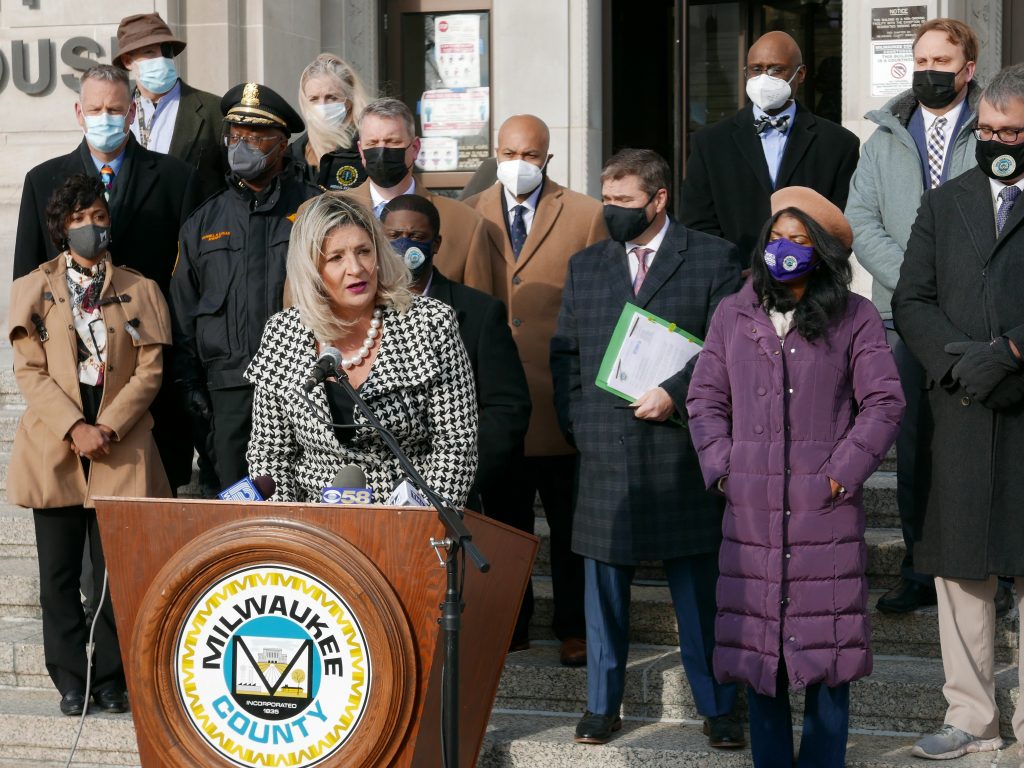County Nets $71 Million From Opioid Lawsuit
That is county's portion of national lawsuit in which Milwaukee played key role.

Milwaukee County Corporation Counsel Margaret Daun. Photo by Graham Kilmer.
Milwaukee County Corporation Counsel Margaret Daun would have liked to see the leaders of pharmaceutical manufacturers and distributors of opioids in jail, but, barring that, she’ll settle for their money.
Milwaukee County, joined by counties and municipalities from around the country, recently finished negotiating a settlement with a handful of opioid manufacturers and distributors that will bring $71 million to the county and can go directly into combating the opioid epidemic and treating the human suffering it has caused.
This settlement is likely only the first, Daun said. The county is also involved in lawsuits related to the opioid epidemic against pharmacies like CVS and Walgreens, and against McKinsey & Company, an international consulting firm that worked with Purdue Pharma, the now infamous pharmaceutical company owned by the Sackler family that produced the drug Oxycontin.
The $71 million coming into the county comes from a federal lawsuit filed in the United States District Court in the Northern District of Ohio. The action was brought against McKesson Corporation, Cardinal Health, Inc., AmerisourceBergen Corporation, Johnson & Johnson, Janssen Pharmaceuticals, Inc., and Ortho-McNeil-Janssen Pharmaceuticals, Inc.
The suit successfully argued that the manufacturers and distributors of prescription opioids misled the public on the risks of long-term use of the drugs and paid no attention to suspicious orders of the highly addictive drugs.
“I was able to turn to the chief executive officers of the manufacturers and distributors of opioids and tell them the toll that it has had on our community, both from a personal and a community wide standpoint,” Daun told the county board’s Judiciary, Safety and General Services Committee Tuesday. “And I gave them that indictment in no uncertain terms.”
She added, “To this day, I consider it an incredible failing of our justice system that none of these individuals will ever see the inside of a jail cell.”
Milwaukee County, and other counties and municipalities in the state, are getting the best deal from the settlement of any local government in the country, Daun and County Executive David Crowley said, at a press conference Tuesday.
On Tuesday, the county executive joined County Board Chairwoman Marcelia Nicholson, County Clerk George Christenson and Daun in signing the settlement agreement.
“This settlement signals accountability for all the parties responsible after years of opioids devastating our communities and taking our lives too soon,” Crowley said. He added that the county has been on both the frontline of the opioid epidemic and the legal battle seeking relief from the companies that were involved in perpetrating it.
Nicholson said local governments are the public institutions closest to those fighting and suffering from opiod addiction and the structure of settlement payments in Wisconsin – giving local government 70 cents of every dollar – puts the money “in the hands of those that are best equipped to do the most good.”
More about the Opioid Crisis
- Baldwin Demands Trump Admin Reverse Billions in Cuts From Opioid and Mental Health Programs - U.S. Sen. Tammy Baldwin - Jan 14th, 2026
- Fox Valley Nurse Practitioner Sentenced to Federal Prison for Unlawful Prescribing - U.S. Department of Justice - Dec 29th, 2025
- County Executive David Crowley Hosts Roundtable on Combating Opioid Crisis and Saving Lives in Wisconsin - David Crowley - Dec 16th, 2025
- Co-Chairs Criticize DHS For Lack of Plan, Transparency with Opioid Settlement Funds - Joint Committee on Finance - Oct 21st, 2025
- Opioid Treatment Program Opens First Clinic in Milwaukee - Isiah Holmes - Oct 20th, 2025
- County Executive Crowley, Chairwoman Nicholson Sign Legislation Approving $9 Million for Efforts to Compat the Opioid Crisis - David Crowley - Aug 15th, 2025
- How Are State’s Local Governments Spending Opioid Settlement Payouts? - Addie Costello - Aug 4th, 2025
- MKE County: How County Will Spend $9 Million in Drug Settlement Funds - Graham Kilmer - Jul 29th, 2025
- Milwaukee County Executive David Crowley Announces Over $9 Million for Initiatives to Combat Opioid Epidemic - David Crowley - Jul 17th, 2025
- AG Kaul, 45 Other Attorneys General Plan to Join $720 Million Settlement with Eight Opioid Drug Makers - Wisconsin Department of Justice - Jul 14th, 2025
Read more about Opioid Crisis here
Political Contributions Tracker
Displaying political contributions between people mentioned in this story. Learn more.
- June 30, 2016 - David Crowley received $1,000 from Chris Abele
MKE County
-
Fellow Judge Testifies in Dugan Case
 Dec 16th, 2025 by Graham Kilmer
Dec 16th, 2025 by Graham Kilmer
-
Key Questions in Dugan Trial Take Shape on First Day
 Dec 15th, 2025 by Graham Kilmer
Dec 15th, 2025 by Graham Kilmer
-
FTA Tells Milwaukee to Crack Down on Fare Evasion — Even Where Fares Don’t Exist
 Dec 12th, 2025 by Graham Kilmer
Dec 12th, 2025 by Graham Kilmer




















